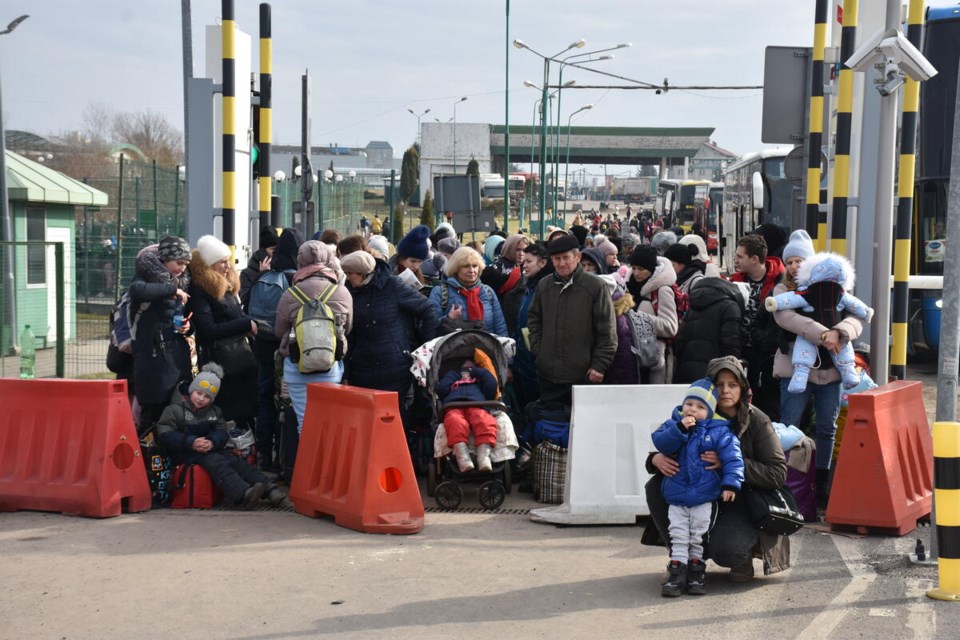Over 500 settlement agencies in partnership with the Ukrainian Canadian Congress are calling on the federal government to allow war-displaced Ukrainians headed to Canada access to federally-funded assistance programs.
Under current Immigration, Refugees and Citizenship Canada (IRCC) policies, only permanent residents are eligible to access federally-funded settlement programs like English language classes, employment assistance programs and childcare services.
Due to their legal status as temporary residents, displaced Ukrainians who are arriving in Canada will not be eligible to access these federal settlement supports, said the Canadian Immigrant Settlement Sector Alliance (CISSA) in a media statement addressed to Prime Minister Justin Trudeau and Immigration Minister Sean Fraser.
“Immigrant serving agencies across Canada are ready to support displaced Ukrainians, but we do not want to be enforcing federal government program eligibility criteria that will impact which Ukrainians we can help,” said Chris Friesen, CISSA chairperson.
“Many Ukrainians fleeing the war will arrive traumatized, in need of much-needed support to help them transition to this country. Ukrainians need to be able to access settlement programs regardless of their legal status,” added Ukrainian Canadian Congress president, Alexandra Chyczij.
Immediate response needed
Russia’s invasion of Ukraine has created one of the biggest refugee crises of modern times. A month into the war, more than 3.7 million Ukrainians have fled to neighbouring countries — the sixth-largest refugee outflow over the past 60-plus years, according to a Pew Research Center analysis of United Nations data.
As part of Canada’s response, Ottawa has announced the creation of a Canada-Ukraine Authorization for Emergency Travel available to individuals fleeing that country. There will be no limit to the number of Ukrainians who can apply.
All Ukrainians who come to Canada as part of these measures will be eligible to apply for open work permits, making it easier for employers to quickly hire Ukrainian nationals. As previously announced, IRCC will also issue open work permits to Ukrainian visitors, workers and students who are currently in Canada and cannot safely go home.
NCM is awaiting a response from IRCC on whether it will amend the program eligibility of federally funded settlement program supports to include temporary residents fleeing conflict zones and refugee claimants seeking asylum.
“While we strongly believe that immigrant settlement and integration is a shared federal/provincial responsibility, the urgency of this situation requires an immediate federal government response to ensure that displaced Ukrainians and other extremely vulnerable, at-risk refugee claimants who are likely to remain in Canada will have the ability to access the wide range of settlement support programs available, when they need them the most, upon arrival in this country regardless of where they settle,” said CISSA in its statement.
In the case of both the federal government’s Rural and Northern Immigration Pilot and the Atlantic Immigration Program, IRCC allows temporary residents and foreign nationals to access select settlement services as soon as they arrive.
“This precedent should be expanded to displaced Ukrainians with temporary residents’ status and refugee claimants,” said CISSA.
“Although some, but not all, Provinces and Territories provide limited funding to support over 800,000 Temporary Residents annually in Canada, (international students, Temporary Foreign Workers, Seasonal Agricultural Workers, and Refugee Claimants), we cannot expect Provinces and Territories to quickly replicate federally funded settlement programs…”where they currently do not exist.”
Differential aid
NCM reported that while many are applauding Canada’s outpouring of humanitarian support for the nearly two million refugees who have fled Ukraine since the Russian attack of Feb. 24, Canadians remain sharply critical of the unequal treatment given to displaced people from other war-torn lands such as Afghanistan, Syria, Palestine and Iraq.
“This is racism to the core,” said Professor Nour El Kadri, of the Telfer School of Management at the University of Ottawa.
He pointed out that while Canada promised to take in 25,000 Syrian refugees during the Syrian crisis in 2015 and 40,000 Afghans after the fall of Kabul to the Taliban, it has not set any limit for Ukrainian refugees.
A new Angus Reid Institute study also showed that when it comes to welcoming refugees, more Canadians are willing to open their hearts and homes to those fleeing the Russian invasion of Ukraine than those escaping the Syrian civil war.
“Canada’s inequitable refugee policy reflects more than laziness on behalf of the government — it carries the weight of a racist, and unfortunately common, rhetoric circulating mainstream media: That Ukrainian refugees, the majority of them white Christian Europeans, will better fit into Canadian society,” Dima Kiwan, a second-year undergraduate student at McGill University, wrote in a recent op-ed for the McGill Tribune.
“To truly offer equal opportunity, the government must acknowledge the racist implications of its policy in this current social climate, instead of dismissing criticisms with the logistical and bureaucratic excuses refugees hear too often.”




